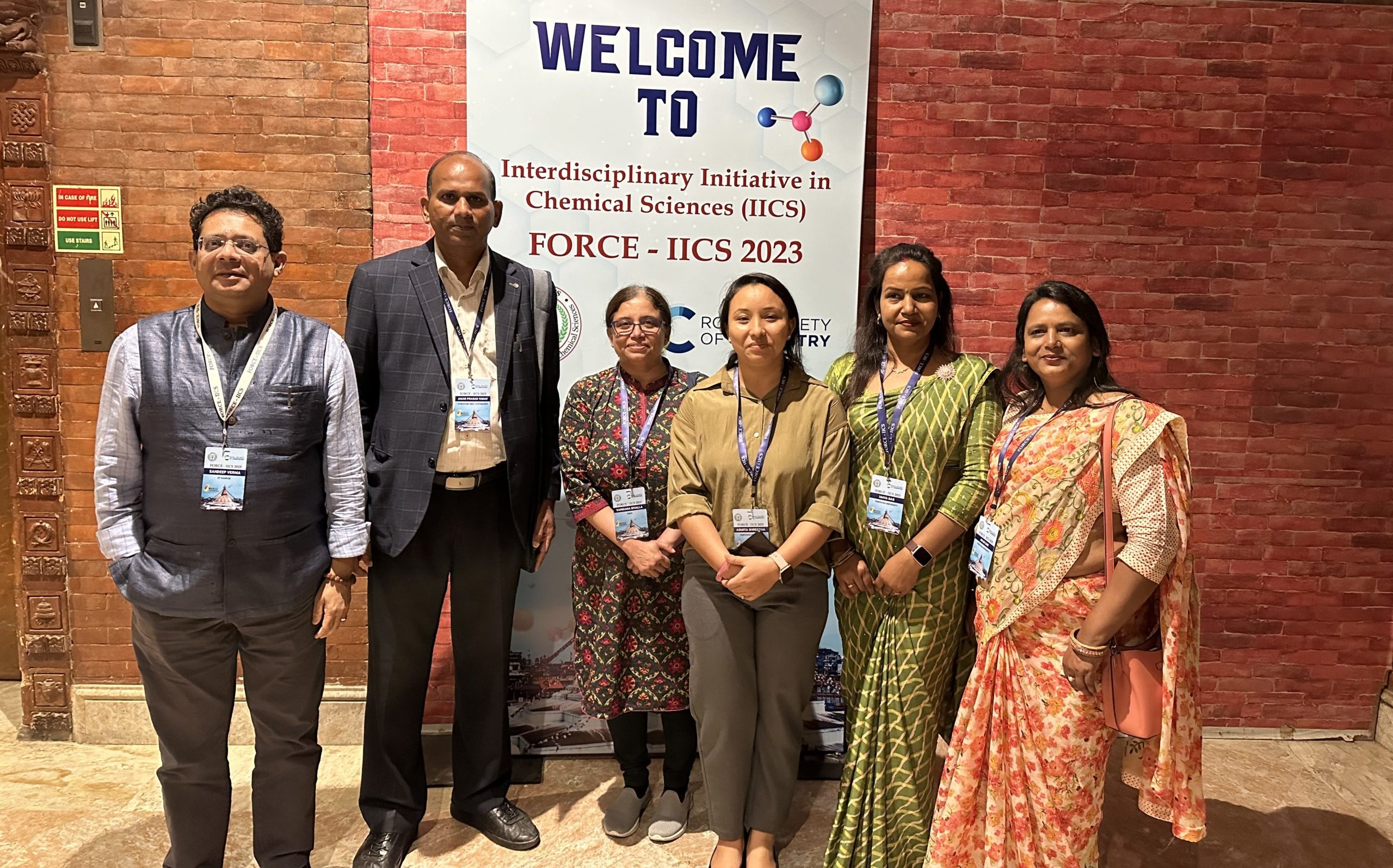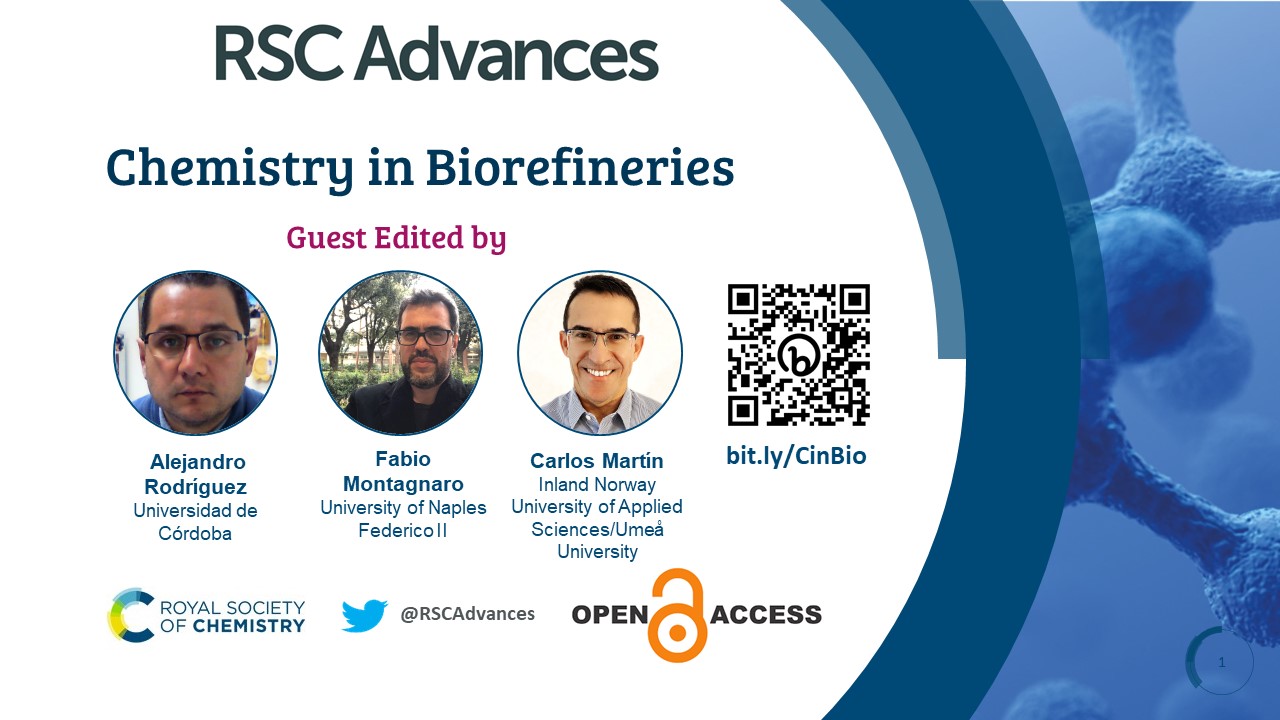Welcome to our Emerging Investigators Series 2022! This series, led by Prof Shirley Nakagaki (Federal University of Paraná, Brazil) and Dr Fabienne Dumoulin (Acıbadem Mehmet Ali Aydınlar Universit, Türkiye), highlights the very best work from early-career researchers in all areas of chemistry. 10 papers were published as part of the collection spanning the breadth of chemistry on topics ranging from green and environmental chemistry, to biological and bioinorganic chemistry, as well as papers that propose theoretical calculations as solutions to chemistry problems. You can read all about the contributions in this accompanying Editorial prepared by Shirley.
We would like to take this opportunity to highlight an author from the series, . We interviewed Ivaldo Itabaiana Junior to find out more about his area of research and his contribution to the series.
Lipase-catalyzed acylation of levoglucosan in continuous flow: antibacterial and biosurfactant studies
Marcelo A. do Nascimento, Juan P. C. Vargas, José G. A. Rodrigues, Raquel A. C. Leão, Patricia H. B. de Moura, Ivana C. R. Leal, Jonathan Bassut, Rodrigo O. M. A. de Souza, Robert Wojcieszake and Ivaldo Itabaiana, Jr
RSC Adv., 2022,12, 3027-3035

Professor Ivaldo Itabaiana Junior holds a degree in Pharmacy from the Federal University of Rio Janeiro (UFRJ), Brazil (2009), a PhD in Pharmaceutical Science from UFRJ (2013) with a sandwich period at the National Hellenic Research Foundation (Athens, Greece), as well as a post-doctorate in Biocatalysis from the Institute of Chemistry of UFRJ, and a Post-doctorate in hybrid catalysis from UCCS – CNRS (Lille, France).
Since 2014, he is an adjunct professor at the School of Chemistry of UFRJ, where he has been developing research on the application of the concepts of biocatalysis, biotransformation, photocatalysis and hybrid catalysis in the valorization of residual lignocellulosic biomass aiming at obtaining value-added compounds, such as enzymes, surfactants, polymers and building blocks, in order to obtain a zero-waste biorefinery. He has more than 58 published papers, and international collaborations, such as UCCS-Lille (France), UCL (Belgium), Universidad de Córdoba (Spain), EIE (Greece), and others. He has more than 12 graduate students, and is currently vice-coordinator of the Graduate Program in Chemical and Biochemical Process Engineering at UFRJ. In his career, he has won awards such as the best doctoral thesis at UFRJ (2014), as well as the Capes Thesis Award, at the national level. He also has projects funded by being a Young Scientist, and a research productivity fellow.
Could you briefly explain the focus of your article to the non-specialist (in one or two sentences only) and why it is of current interest?
This article aimed to obtain a compound with antibacterial and surfactant properties from a precursor derived from agro-industrial waste, as a form of reuse, aiming at an environmentally friendly process.
How big an impact could your results potentially have?
This work can generate an industrial product that presents great biosurfactant and antibacterial capacity, produced under mild conditions of reaction, since it comes from an enzymatic way and presents as substrate the levoglucosan, originated from residual biomass pyrolysis. Therefore, our results move towards a possible construction of an integrated process of valorisation of lignocellulosic biomass, with probability of low cost steps.
Could you explain the motivation behind this study?
My research currently involves the valorization of Brazilian and worldwide residual biomass, aiming to obtain molecules that contribute to the society in general, in order to contribute to the improvement of the quality of life. The lignocellulosic residues, as a reflection of the increase in life expectancy of the world population and the consequent industrialization, have increased alarmingly, and new processes to add these components back into the productive chain are required. Our group has work in this challenging area, where this article is part of a project of valorisation of levoglucosan, a compound that has origin in the fast pyrolysis of these biomasses.
In your opinion, what are the key design considerations for your study?
Levoglucosan (LG) is a challenging molecule since it is obtained through pyrolysis of residual lignocellulosic biomass. Our group has been studying better conditions to obtain LG through fast pyrolysis of several biomasses. As it is a complex mixture of compounds, pyrolysis products also challenge us to develop new technologies for the best use of these fractions, and with this, my line of research has been based on the coupling of biocatalysis, photocatalysis, and hybrid catalysis in obtaining new compounds that can add value and return the residual biomass to the production chain, as a way of establishing future zero biorefineries.
LG chemically challenges us in obtaining compounds of industrial importance, since it presents a structure with steric hindrance, and there are still few published works where this molecule is applied as a substrate or starting reagent for obtaining derived compounds. Therefore, we seek to fill a gap in the literature, and we hope to succeed.
Which part of the work towards this paper proved to be most challenging?
In my opinion, the characterization of the esterification reaction products were the most challenging, since levoglucosan presents a differentiated stereochemistry, generating the possibility of formation of more than one product. Thus, some previous steps of separation and characterization with different physical methods were necessary to evaluate and quantify the products formed. Moreover, the biomass pyrolysis and optimization step to obtain larger amounts of levoglucosan also deserves attention due to the complexity of lignocellulosic materials.
What aspect of your work are you most excited about at the moment?
At this point in our research, we were able to couple important results on photocatalysis and biocatalysis in the construction of new catalysts that managed to improve the reaction selectivity of LG with other compounds, in order to obtain new molecules with biosurfactant potential. We are advancing in this part and managing to build new catalytic systems for the valorization of other molecules from residual biomass.
We are also investing in collaborations for process modeling and building robust models for the prediction of better catalytic conditions, which are more economically viable and sustainable, and we are obtaining encouraging results.
How has your research evolved from your first article to this particular article?
My first paper in my scientific career was published demonstrating the phytochemical study of medicinal plants with antimicrobial properties. Currently, we seek, through the valorization of lignocellulosic biomass, to obtain new molecules that also have this application. It is interesting to carry out this relationship, where I could realize that over time, I could follow the evolution of science and technology, and couple the knowledge acquired in my work, without escaping my main objectives, which are to find molecules that can improve the quality of life of the world population.
What is the next step? What work is planned?
Some molecules derived from lignocellulosic biomass showed potential biological activity, and in this sense, the next steps will be to improve yields and selectivity in obtaining these compounds, increase the scale of production and perform new more specific assays to determine mechanism of action and new models of activity. We hope to continue publishing new processes, technologies and integrated results of synthesis and application.
Why did you want to publish in RSC Advances?
The publication of the article in RSC Advances came from a prior invitation from the editor, which we were very happy about. The journal has a relevant impact in the area of biocatalysis and biotechnology, with very inspiring works. Our group already has previous works in this journal, the impact was very positive.
What are your thoughts on open access publishing?
In my opinion Open Access publishing should be a standard within the academic world. The dissemination of knowledge is a fundamental pillar for science, which is the one that produces knowledge. Unfortunately, the capitalist world still imposes many barriers for scientists to know the work of other colleagues, or to carry out more grandiose research, which could improve the quality of life of the world population. And it all starts with greater access to information.

Submit to RSC Advances today! Check out our author guidelines for information on our article types or find out more about the advantages of publishing in a Royal Society of Chemistry journal.
Keep up to date with our latest Popular Advances articles, Reviews, Collections & more by following us on Twitter. You can also keep informed by signing up to our E-Alerts.
Comments Off on RSC Advances Emerging Investigators Series 2022 – Author Spotlight

















